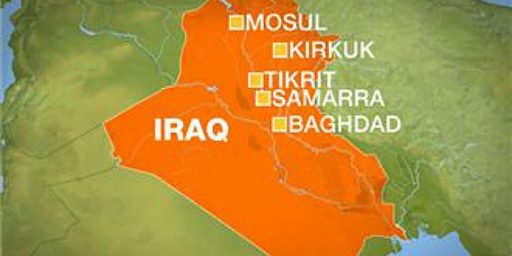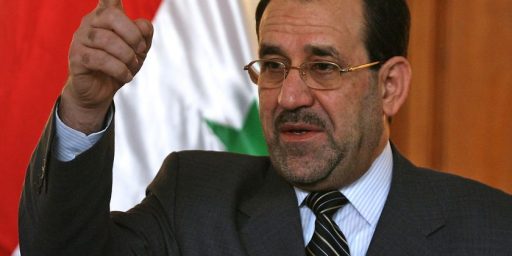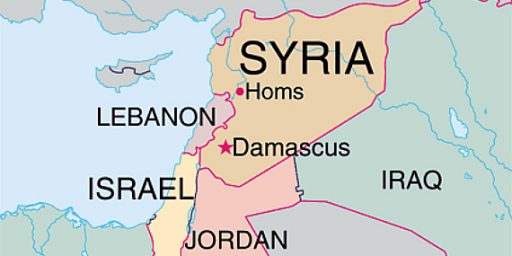Shiites Magnanimous in Victory
Iraqi Shiites Win, but Margin Is Less Than Projection (NYT rss)
A broad Shiite alliance led by two Iran-backed religious parties won a slim majority of seats in the national assembly, final election results showed Sunday. The alliance’s victory – in the first fully elected parliament in Iraq’s 85-year history as a separate state – was narrower than the alliance had projected and set the stage for protracted maneuvering. The 8.5 million people who voted, a turnout of 58 percent, appeared to have spread their choices widely enough to assure that power in the new government, and in the drafting of a new constitution, will have to be broadly shared among the assembly’s 275 members, lessening the possibility that a religious Shiite theocracy could emerge from the elections.
Calculations based on voting results indicated that while the Shiite alliance had won about 48 percent of the popular vote, it would hold 140 seats, or 2 more than required for a majority. Until just before results were announced, alliance officials said they were expecting 150 seats. That number would have brought them closer to the two-thirds majority required to name a new government and to take the controlling hand in writing a constitution. Instead, heavy Kurdish voting in the north and secular voting in Baghdad and Basra offset the alliance’s sweep in most of the southern provinces. About 75 seats in the new assembly appeared headed for an alliance of Iraq’s two main Kurdish parties, which dominated the votes of Iraq’s heavily mountainous far north. A party led by Ayad Allawi, a secular Shiite who has been interim prime minister, seemed likely to take 40 seats, the largest bloc controlled by any individual leader. Five seats appeared likely to go to Sheik Ghazi al-Yawar, the interim president, one of a handful of Sunni leaders who did not boycott the elections, and the only Sunni figure of national standing who appeared to have secured a place in the assembly. The remaining 15 seats will be scattered among eight other parties. Three seats seemed likely to go to a group loyal to Moktada al-Sadr, the volatile Shiite cleric who has twice led uprisings against American troops, and another three seats to a Turkman party. Two seats each seemed likely to be taken by a vestige of Iraq’s old Communist party and by two moderate Islamic splinter parties, one Kurdish and the other Shiite. Three other seats, unofficial calculations show, will go to individuals, one of them an Assyrian Christian, one a former American-appointed governor of Nineveh Province and one the leader of a small party called the National Democratic Alliance.
I’m not a fan of proportional representation, as it gives power to fringe parties far out of proportion to their size. This is true because governing coalitions will often/usually include tiny parties who can threaten to take their ball and go home if they don’t get their way. As a result, the tail often wags the dog. Still, this may be a good system for Iraq, especially for this transitional period. The sense of inclusion should be heightened and more compromise will be forced in the drafting of the permanent constitution, which will write the rules to the Iraqi polity for some time to come.
The election results make necessary what was apparently already the inclination of Sistani and other Shi’a leaders: a sense that they had to ensure that the Sunnis and Kurds had a stake in the society if Iraq was to survive as an intact entity.
Shiites Walk Softly in New Landscape (LAT)
The lopsided victory by Iraq’s Shiite Muslim alliance gives it the biggest voice in shaping the nation’s new government and constitution. But at the moment of their triumph, Shiite leaders have decided to accentuate moderation and inclusiveness to win over their political rivals. The need to defeat the insurgency that has claimed thousands of lives and almost paralyzed reconstruction, along with checks negotiated into the transitional law, will keep the Shiites from moves that would offend other groups, such as trying to impose Islamic law, politicians here say.
[…]
But if one listens to what the Shiite slate has been saying, there has been a reassuring consistency: Its members are not bent on dominating the political scene, even though Shiites are a majority in Iraq and were long repressed under Saddam Hussein. Rather, they want to cooperate with Iraq’s minority groups, including Sunni Arabs, favored under Hussein, and ethnic Kurds, most of whom are also Sunni.
[…]
Instead of trying to cobble together enough allies to form a strong parliamentary majority to ram through legislation, he said, the slate is seeking to create a government that would include all, or as many as possible, of the 12 electoral slates that won seats in the assembly — plus some Sunni groups that did not participate. And instead of grabbing all the best government ministries for itself, it is considering using a complex point system that would give weight to each of the main political, religious and ethnic groups. For instance, if a government minister is a Shiite, his or her two deputies might be a Kurd and a Sunni, and their assistants might be Turkmen or Christian, he said.Although drawing a line at appeasing former Baathists or extremists who have committed crimes against the Iraqi people, and promising an early drive to cleanse the Iraqi security forces of infiltrators, he said the new government would be “one of the most inclusive, and certainly the most representative government in the history of Iraq.”
Shiites reach out to Sunnis after vote triumph (Turkish Press)
Iraq’s long-oppressed Shiites were basking in their electoral triumph but pledged to reach out to rival Sunnis whose political isolation could further threaten the country’s stability.
[…]
“Iraq is bleeding and we need everybody at this juncture to work for solidarity and unity,” said Finance Minister Adel Abdel Mahdi, a leading member of the winning Shiite list who is also seen as a likely prime minister. “We have stated previously and we repeat that we will follow the principle of dialogue and we will work with all those who were excluded or excluded themselves from these elections,” he added.
This is not only wise politics but, frankly, quite generous indeed given the brutal oppression the Shi’a suffered at the hands of the Ba’athist Sunnis. If this spirit holds, it’s more than we had any right to hope for.
The Kurds seem to have bought into it as well:
The alliance of the two historical Kurdish heavyweights secured a stunning victory thanks to high turnout rates in the north, making Kurds likely political kingmakers after decades of struggle against Sunni regimes. With more than a quarter of the vote and a predicted 75 seats in parliament as well as an absolute majority in the provincial council of oil-rich Kirkuk, Kurds celebrated by shooting into the air and driving with Kurdistani flags flying from windows.
Kurdish leaders said they would push for federalism to protect their autonomy, but also moved to allay fears of rival ethnic groups in the north that they would seek to break away.
A Bloomberg report adds,
There is a tacit agreement that the prime minister will be a Shiite, the president a Kurd and one of two vice presidents a Sunni, according to Yahia Said of the London School of Economics and Nadim Shehadi of the London-based Chatham House. Kurds and Sunnis won’t accept a clerical Shiite, ensuring that Sharia, or Islamic Law, isn’t enshrined in the constitution as the primary source of law, they said. “The Kurds should be given one or two prominent external positions, like president or vice president,” Ali Allawi, a former defense minister in the Iraqi Governing Council and a member of the Shia List, said in a Feb. 4 interview. They “have every right to expect key positions of state.”
This outcome would have seemed fantastical a few years ago, when the U.S. and our allies were patrolling no fly zones over the Kurdish and Shi’a regions. No one would have predicted an intact Iraq with the Shi’a and Kurds dominating and yet not seeking retribution against the Sunni.
Update (1155): Dan Drezner has more coverage and analysis, noting quite a bit of disparity in the coverage of the major dailies. He notes, too, a post by Juan Cole asserting, “Allawi’s defeat (he will not be prime minister in the new government) is a huge defeat for the Bush administration, though it will not be reported that way in the corporate media.” His rationale is that Allawi had the advantages of incumbency and U.S. backing and that some in the winning coalition “will press hard for implementation of Islamic law.” The evidence over the last few weeks, though, seems to suggest otherwise.
Update (1945): Steven Taylor points out that a class or two in comparative politics might be helpful to those reporting on elections.






I think at the very least you can argue that the Shia want democracy to work in Iraq, and understand that it will work best, if everyone is included.
Also, I figure the Shia in Iraq at least are tired of the bombings etc, I wonder if they aren’t thinking that inclusion of the Sunni’s in government, will help put the nails in the coffins of the insurgents.
Then there is the issue of ratifying any constitution-the Sunni’s can make or break any constitution, when it comes to ratification time-so it is best to have them on board from the begining.
“that some in the winning coalition “will press hard for implementation of Islamic law.” The evidence over the last few weeks, though, seems to suggest otherwise.”
Thought you might want to pop on over to Riverbend’s blog and see her personal account of the islamisation going on.
http://riverbendblog.blogspot.com/
riverbend, yeah, sure
I have discovered that if I take the inverse of what riverbend says I get the real story.
As for the Sunni’s, I don’t recall that there was a comparative worry about the afrikanners when South Africa was feeling it way to democracy.
Most Afrikaners, AFAIK, were fed up with apartheid and didn’t care if it died. I don’t think the Sunnis are in a similar state of mind in Iraq about being in the minority numerically and politically.
DC Loser–
Then what about the Presidential election of 1868, that elected Grant? Virginia, Mississippi, and Texas were not allowed to vote as “unreconstructed states.” I seem to recall quite a few upset Southerners around that time. Was Grant’s election illegimate?
“Was Grant’s election illegimate?”
Well, my tongue in cheek response from the Commonwealth of Virginia is “that depends.”
Serioulsy, what does that have to do with the price of tea in China? My original remark about Riverbend’s blog is that she claims creeping Islamism is already a fact of life in Baghdad, where she lives. I think her observations kind of belie some of the more optimistic prognostications of the election results concerning the limited religious agenda of the Shiite Islamist parties.
DC Loser–
That was just in regards to the Sunnis and Afrikaners comments. Riverbend’s been quite consistently negative. I hope things go well, but it does all depend on the people of Iraq. Perhaps they won’t be able to form a democracy. I think it will have been worth making the attempt, though. I’m generally not in favor of supporting an autocrat in the area who will liberalize– I thought that was the lesson of the Shah of Iran.
We can do little other than trust the people of Iraq.
Since day one I thought it would be a great irony to spend American lives to set up an Islamist theocracy in Iraq. The Ayatollahs next door would approve.